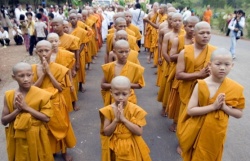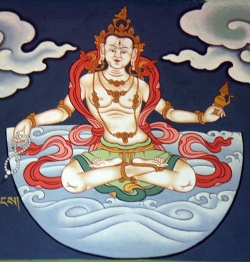Is Anatta the Central Doctrine of Budhism? by Peter Morrell
Is Anatta the Central Doctrine of Budhism?
by Peter Morrell
The view being proposed belongs to a Hinayanist, a follower of the Lesser Vehicle. As a Mahayanist, I shall expound their view. I do not believe the basic premise is correct, that Anatta is the fundamental basis of Buddhism, and I will try to show the basis for my view.
Anatta is the non-self as opposed to the self or atman of Hinduism. Thus it stems primarily from a comparison of Buddhism against Hinduism. We must look at the basis of atman in Hinduism for a clue. The atman of Hinduism is a device to explain the working of karma. The atman-soul is that which migrates from life to life under the influence of karma
until it attains moksha or release -- the soul merging with Brahman. One problem is that Moksha is never really attained in Hinduism. Buddha, through his enlightenment experience, showed that there is no self, or rather he showed that the nature of self as construed in Hinduism, is illusory. Some called this anatta, but in reality what
Buddha taught was that self and non-self are BOTH illusions and that we should take a path which avoids both extremes, away from nihilism on the one hand and from eternalism on the other. Thus he meant that we should dismiss the
idea of self and an eternal soul, which endlessly migrates from life to life (eternalism), and also reject the idea of one soul and one life which is forever extinguished at death (nihilism). Both constitute 'falling into extreme views'.
In order to avoid 'falling into extreme views' one must regard both as in-valid paths and that neither are true or false in their entirety. He thus proposed anatman (anatta) as a way out of the impasse. If you reject the atman and eternalism of Hindu philosophy, then what can you put in its place? There must be 'something' which passes from life to life and upon
which karma acts, and which forms a 'theatre' for the manifestation of good and bad karmas to come to fruition. Mahayanists posit the existence of a mindstream or flow of consciousness which flows on connecting all lifetimes together. One way is to assert that the fundamental basis of existence, including atman, is flux or fluid and that all things are
illusory, not in the sense of being unreal, but of being dependent upon other things and upon a basic emptiness or formlessness. This doctrine reached its greatest development in the Mahayana concept of shunyata, as you seem to suggest. The non-thingness of life applies to all external phenomena as well as a self or soul. Thus anatta is not a
fundamental (ultimate) truth as it is dependent upon the deeper truth of the enlightenment experience, showing that ALL phenomena are fundamentally empty of real existence, ie. impermanent. This is graphically illustrated in Bertolucci's film 'Little Buddha'.
Anatta is stressed in Theravada (the path of elders) or Hinayana (Lesser Vehicle) precisely because that school claims to be ancient and original and thus closest to Hinduism. Theravada barely concedes that Buddhism is much more than a subsect of Hinduism. And they have not progressed since 200BC in their views. They also reject all later forms of
Buddhism. The Hinayana view is that only after countless aeons can a person attain the nirvana of 'release from self' (Arhatship), and also that the full Buddhahood, as proposed in Mahayana, is unattainable or non-existent. They reject the Mahayana path based upon compassion and good works and focus instead entirely on attainment of a 'release
from self' for one individual. Called 'shravakas' (= listeners, hearers) by Mahayanists, they follow a path of pure selfishness, intent only on the miserable goal of their own liberation while ignoring a creation (samsara) completely permeated by suffering.
I would contend that the answer to your question lies in the practical path which Buddhism offers humanity. The practical path means that if you wish to attain enlightenment you must reach a point where the concept of self is surrendered. But attaining selflessness is not enlightenment, it is merely the nirvana (Arhatship) of the [[Lesser
Vehicle]]. Enlightenment is the transformation of the mind of a person into the mind of a Buddha. The mind of a Buddha sees the world as a fluid state of fluxes of impermanent 'fluids' ever moving. The mind of a Budddha also has
many other uniquely virtuous qualities, chief among which are permanent ie. non-fading bliss, non- attachment, great joy, great wisdom and great compassion.
Thus I would conclude, for what my view is worth, that anatta is not the fundamental basis of Buddhism, but that a stock of other teachings are far more centrally important. These include the innate impurities (desire, hatred, ignorance), impermanence and the illusory nature of all phenomena. Even compassion can be viewed as more central than anatta,
because good deeds eventually lead one into better and better lives with increasing contact with higher beings and clearer understanding of the doctrine (dharma). Compassion could very easily be posited, therefore, as the fundamental basis of all Buddhist teachings.
In essence, Buddhism really comprises 'PATHS for beings to follow', and these paths form 3 collections of antidotes which apply to -- deeds/conduct, to words and to thoughts. Ethics apply to establishing correct conduct, ie. conduct which is fundamentally harmless to other beings and to self, which also accumulates Merit by doing good. The antidotes to bad words
also comprise ethical codes applied to words and speech. But it is thoughts and mind which require the greatest training and improvement, and which, of course, also lie behind words and actions. There are methods for stopping negative thoughts -- desire, hatred and anger principally -- and the cultivation of good thoughts. The mental
trainings are really antidotes to wrong views and the cleansing of impurities. These involve, ultimately, the accumulation of great wisdom, while through the external speech and conduct trainings one achieves the accumulations of great merit.
It is the lack of these two accumulations of merit and wisdom which stands between us and enlightenment. Once these 2 collections are attained then one passes swiftly through the Bodhisattva stages to complete enlightenment ie. Buddhahood. The superior qualities of a Buddha are legion as described in the Mahayana scriptures.
Hatred and desire are overcome, but the last and most fundamentally innate impurity is illusion -- illusion of the ignorance of the true nature of reality -- which in Mahayana is termed the view of emptiness (shunyata), which is the view of enlightenment, the view of a Buddha. Thus all the paths offer gradual reductions in impurity and
illusion and thus the stripping away of the layers of illusory non-Buddha-ness until only the innate and fundamentally pure Buddha nature (tathagata-garbha - 'the essence of a one gone thus') is left.
In all these senses I do not believe your proposition that anatta is the fundamental or core teaching of Buddhism, but that emptiness or shunyata is that which certainly underpins the whole structure, and is much more central and is an ultimate truth. In a nutshell I would therefore state that impermanence is the fundamental central teaching of Buddhism and upon which
everything else rests. Indeed, without a profound and continuous realisation of impermanence, which forms the very fabric of creation (Samsara) there can be generated no dissatisfaction with it and thus no motivation to leave it. As Tsong Khapa says (see below):
- 'Without a complete thought definitely to leave cyclic existenceThere is no way to stop seeking pleasurable effects in the ocean of existence.'
Buddhism is entirely rooted upon that type of shrewd analysis of the nature of embodied existence; unless we come to that view there is no basis for any of the rest of Buddhist doctrines. If you think existence is OK and pleasant -- ie. fundamentally satisfactory and tolerable -- then why/how w/could you ever arrive at a view that 'leaving it' (ie. seeking
enlightenment) is a good option? The basis of Buddhism is that existence is, in fact, fundamentally unsatisfactory because it is so shot through with suffering, change, loss and impermanence and thus finding some secure refuge and 'pleasant abode' in such a changing and insecure universe is very, very difficult.
Buddha proposes that there is only ONE such refuge -- enlightenment, or release from samsara. In order to convey how difficult following his path would be, Buddha answered the question -- 'how many will attain enlightenment?' -- by scratching the dirt and pointing to the dust under his fingernail and saying: 'This many compared to the weight of the world.'



